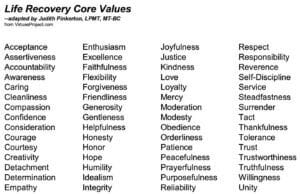
“6 Habits of Music Medicine for Highly Empowered People”
HABIT 6 – ENVIRONMENT CONSCIOUSNESS
Extended Activities
Habit 6
Extended Activity 1
Identify future themes of optimistic expectations desired in your life and cultivate when and where to match music to create those experiences, following these three easy steps.
- Forecast a future goal with optimistic expectations.
- Match optimistic lyric with happy music to your goal which will anchor and attract positive expectations within the unfoldment.
- Listen to the music daily to cultivate your mindset, increase motivation to envision, and to plan the goal’s manifestation in your life.
For example, you want to enjoy an exotic island vacation. Choose Bob Marley or Jimmy Buffet’s music to listen to daily as you match your intention and planning process with choosing the island of Jamaica, investigating areas of interest, scheduling tropical time off and arranging travel details.
Habit 6
Extended Activity 2
Observe how your environment is impacting your thoughts and emotions. Are you able to focus and concentrate easily, with minimal distraction? Consider implementing these strategies.
Strategies
- Manipulate background music (i.e. headphone volume to block external stimuli – but not too loud that affects hearing loss) to enhance focus and concentration.
- Analyze what external stimuli could be guiding unconscious motivations that drive your instinctive music listening habits impacting thoughts and feelings. What might you be avoiding or perseverating on, and name the associated mood and desired music. If it’s an unsettled mood, adapt a Mood Sequence Formula to enhance your [private] mental health environment, shifting your mood positively, regularly, to experience emotional fluidity and enhanced resilience. You can do this as you are walking to an appointment, driving in the car (observing good driving habits), or while working on a project.
- Practice emotional fluidity with Mood Sequence Formulas regularly. Use private listening space to apply music like medicine because it could be good medicine for you and bad medicine for someone else.
Read more about the use of background music in “Improve Mental Health Environments” at https://themusic4life.com/improve-mental-health-environments
Habit 6
Extended Activity 3
Use music to support peace and well-being during hospital stays, exercise routines, and sleep. Sleep is important daily for physical health because it impacts memory, happiness, and depression. The widespread use of pharmaceutical sleep aids develops negative side effects, provoking people to search for non-pharmaceutical, less costly alternatives. Music can help you sleep using these four different approaches: shifting, conditioning, entrainment and blocking.
Four Sleep Approaches
- Shifting. For promoting sleep, music’s properties are unique in shifting mental and physical states.
- Conditioning. For typical routines, preferred music becomes a conditioned habit.
- Entrainment. For alpha and theta states of consciousness, music can induce relaxation and drowsiness through entrainment.
- Blocking. For distractions, music can block stimuli, both internal and external.
Learn about one study that reports music as a sleep aid with 403 people recommending how to incorporate music into the sleep cycle.
Access sleep aid suggestions in “Music to Enhance Sleep” at https://themusic4life.com/music-to-enhance-sleep
Habit 6
Extended Activity 4
Your environments change in a positive way when you express confidently what supports you behaving positively. Practice matching these core values with positive (lyric) music to flourish in an empowered way. Follow this 4-Step regimen to sustain your focus as an action warrior.
- Reflect on moments you’ve been able to overcome obstacles, sometimes feeling like you wouldn’t make it through, and proved yourself wrong.
- Choose the core value that matches that moment.
- Select “S” or “E” music that matches that core value.
- Listen to the music daily to strengthen those core values, i.e. morning time to set the tone of the day, during the day when your confidence weakens, and/or evening time to satiate desired dreams.
Examples of matching Core Values with supportive music ideas.
Obedience or Self-Discipline – “Simple Man” by Lynyrd Skynyrd or Shine Down
Gentleness – “On Guard” by Allegro Cole

Habit 6
Extended Activity 5
Create a circle of friends to share Music4Life® that reaffirms what you’ve learned, supporting yourself first, then family, friends – and even teams – with improved productivity, energy, peace and happiness.
Six Steps to lead circles that improve social health:
- Start with one close friend or family member.
- Share a song that describes you and why, and invite their comments (be okay with what is said and dive deeper to understand why that description).
- Be the reason someone believes in good people: share music and invite music they apply as medicine. What does the other person enjoy and why?
- Encourage music environments with private sound space because “what stops pain for you may create pain for someone else.” Access private listening spaces using soundproofed space, earbuds or headphones to avoid triggering someone else into injurious behaviors towards self or others.
- Develop prescriptive music listening discussions to generate empathy, deliver education, and develop insights.
- Share key differences between the profession of Music Therapy and Music4Life’s Music Medicine protocol.
Learn more to boost your confidence in sharing, leading and offering observations for others to learn about Music4Life’s awesome benefits! Check out trainings at MusicMedicineAcademy.com and expand your outreach through your circles of family, friends and teams.
Copyright 2022 Music 4 Life, Inc. All Rights Reserved.

